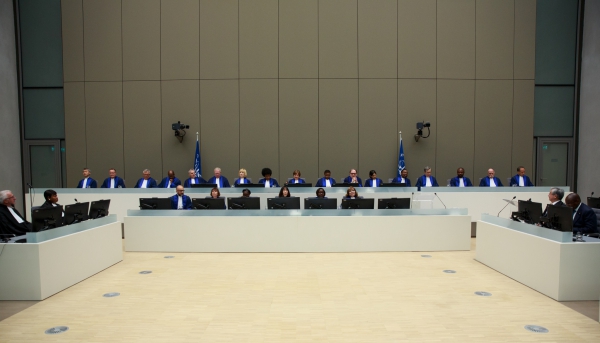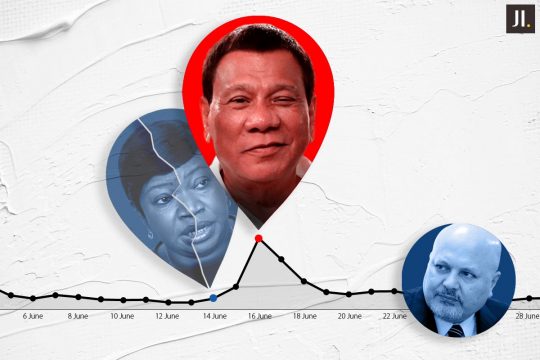After Burundi in 2016, the Philippines decided this March 16 to pull out of the Rome Treaty which created the International Criminal Court (ICC). In both cases, the decision followed announcements by the ICC Prosecutor that she was opening preliminary examinations on alleged crimes committed in those countries, including by their political leaders. The withdrawal decisions come in a specific context which is not linked to the standoff between some states notably in the African Union and the Court. According to a number of experts, recurring threats from states opposed to ICC decisions should incite it to work harder, and especially better.
The Philippines said in its formal withdrawal letter to the UN on March 17 that it has its own legislation to deal with mass crimes. It became a member of the ICC in 2011. In October 2016, only three months after the election of Rodrigo Duterte who promised to free the country of drugs, ICC Prosecutor Fatou Bensouda issued a warning to Manila, provoking a first defiant response from the Philippines president. On February 8, 2018, the Prosecutor announced she was opening a preliminary examination – first step towards a possible full investigation – on alleged crimes committed since July 1, 2016 in the “war on drugs” launched by Duterte”. It is alleged that "thousands of persons have been killed for reasons related to their alleged involvement in illegal drug use", Bensouda said.
According to official statistics, nearly 4,100 suspected drug traffickers and users have been killed by police. NGOs say the figure is three times higher. This is the context in which on March 17 the Philippines gave official notice, after various threats, that it was pulling out of the ICC. Two days later, the Philippines president toughened his accusations, hoping to incite others amongst the ICC’s 123 member states to do the same. He called the Court a body of “white idiots of the European Union” aimed at “purging their sins” from the colonial era. But Duterte’s decision looks like an admission of guilt. This, in effect, is what the Philippines Coalition for the ICC says in a statement. “The Filipino people’s hopes and dreams for holding human rights violators accountable should not be doused by a single man’s fear of accountability,” it says.
Race against time
The Philippines withdrawal from the ICC will become effective in a year’s time. But if the ICC Prosecutor decides between now and then to open a formal investigation, Manila is still legally obliged to cooperate with the Court. Withdrawal does not cancel out ICC judicial procedures. The Philippines will not therefore win easily by withdrawing.
Burundi has already lost this race against time, provoking the announcement in extremis in October 2017 of an ICC investigation and so accelerating the conclusion of the Prosecutor’s preliminary examination. President Rodrigo Duterte’s aggressive reaction to the Court no doubt also motivated Fatou Bensouda’s decision. From Libya to South Africa, the Court’s history often shows that if states respect the Court’s Statute, i.e. accept dialogue in its judicial proceedings or before its Assembly, they can avoid cut-and-dried decisions. After the Philippines’ withdrawal announcement, Assembly of States Parties President O-Gon Kwon invited it to stay and engage dialogue, while the Court encouraged the country to stay in the “ICC family”.
Such appeals are likely to fall on deaf ears. Withdrawal is a blow to victims and to the ICC. “What it does is that it again exposes Filipinos to possible atrocious crimes without resort to justice and accountability,” says Philippines Coalition for the ICC head Ray Paolo Santiago. “Sadly, this move is anti-people.”
“The withdrawals regrettably damage the Court,” says international law professor Morten Bergsmo. “International criminal justice in its current form depends on the commitment and co-operation of States. Both enforcement of justice in specific cases and the desired deterrent effect of the ICC depend on States.”
“While it may seem that the withdrawals complicate matters for the Court, legally they do not make much difference,” says Leiden University researcher Sergey Vasiliev. “The point is that not the law but the political will to cooperate is the main obstacle. The ICC would have had to investigate remotely in any event, which is of course not an ideal scenario.”
The extent to which states cooperate with the Court is a variable, including for its most enthusiastic members. From the Democratic Republic of Congo to Côte d’Ivoire, it depends on the interests of each one and of their allies.
Withdrawal as a counter-threat
“Although drawing on similar rhetoric, the African states' (aborted) withdrawals and that of the Philippines are rather different in their meaning and effects,” says Sergey Vasiliev. “The latter appears less menacing for the ICC and does not bring its credentials in question as much; on the contrary, it may end up playing into its hands by boosting its image as a principled anti-impunity agent that speaks truth to power and hears the power speak back.”
The Philippines president’s calls do not herald a mass withdrawal. The ICC’s existence, which is itself a threat, has provoked a form of counter-threat from states that do not like its decisions. In the Court’s standoff with the African Union since 2009 – triggered by ICC arrest warrants against Sudanese president Omar Al Bashir – the threat of a mass withdrawal has become a weapon of those who, rightly or wrongly, oppose its decisions. The threat is used both by those like South Africa who object to certain of its actions and those who are more opportunistic like Gambia’s ex- president Yahya Jammeh, who started withdrawal proceedings before they were reversed by his elected successor Adama Barrow.
So how should the ICC respond to these withdrawals? “By raising the reputation of the quality of the Court's work and the integrity of its leaders, the Court and the Assembly of States Parties will make it harder for governments to withdraw,” says Morten Bergsmo. “A strong reputation provides better protection for the Court. Quality feeds a virtuous circle.”
The Court’s adversaries love to use its failings, whether it be the weakness of its evidence – such as in the Kenya cases --, the number of verdicts handed down (only seven in 20 years of existence), controversial penal strategy choices or bad governance. “The political cost of threatening the Court increases when the Court's reputation is strong,” Bergsmo thinks. “Its current vulnerability is not overcome by outreach and interventions by friendly NGOs and diplomats, but by the shield of quality justice.”
“In terms of the rhetoric or symbolic power the Court holds, it can preserve it only if it acts and is seen as truly impartial and does it work without fear or favour,” says Vasiliev, “including where it means challenging geopolitical hegemons where the mandate so requires.”





